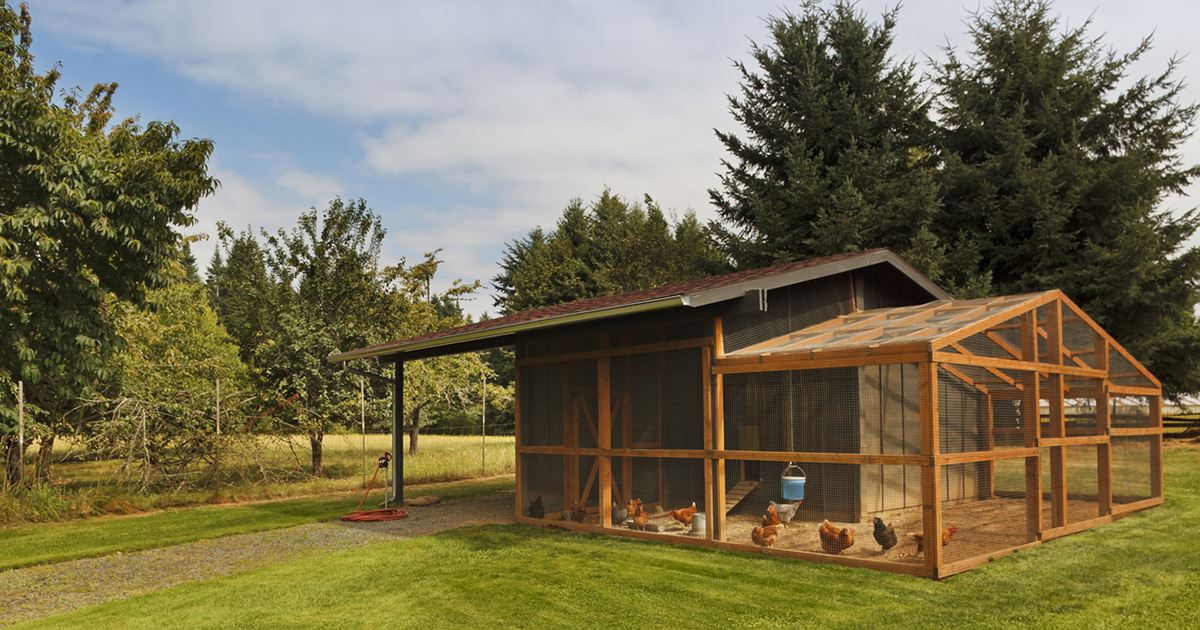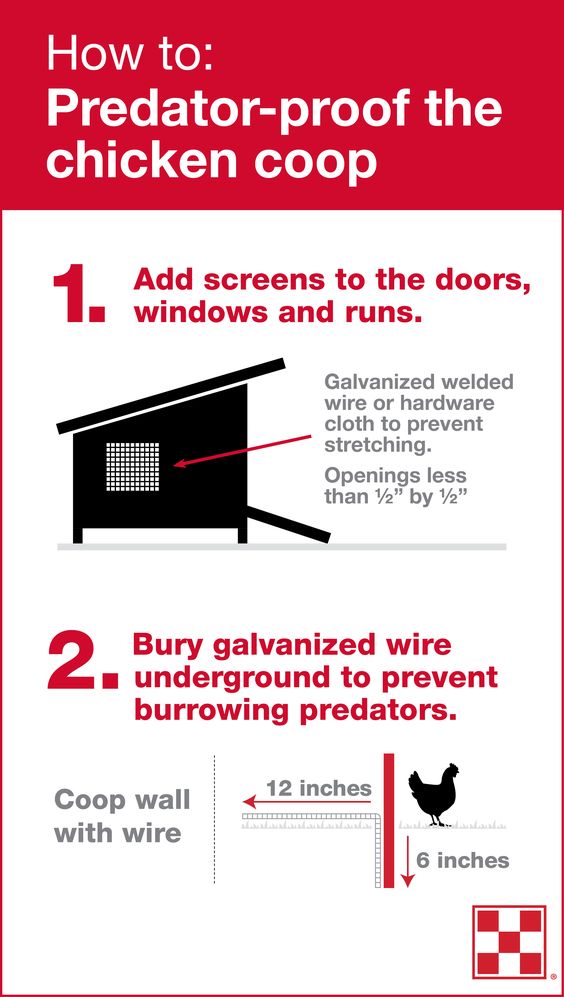Building an Oasis for the Flock
Apr 03, 2020
Megan Hasenour | Marketing Communication Manager

Chicken coops should provide shelter and protection to your flock. When building a coop, keep these 6 points in mind: space, protection, access, air, light and nutrition.
Think of a cathedral when designing a coop. Architect Frank Lloyd Wright said this quote decades ago, and we believe his words still hold meaning today. “A chicken coop is a home to your birds, providing shelter for your flock and a centerpiece of your backyard.”
Focus on safety and comfort to your birds and convenience to you and your family to care for the flock.
Here are a few pointers and tips when building your coops this spring:
Plenty of Space
Coop space for chickens is key. Your chickens should be able to have indoor and outdoor access, meaning having a nice cozy home inside and a playground with roaming room outside. There should be at least 4 square feet of indoor space and 8 square feet of outdoor space per chicken. Move your chicks to the coop around 6 weeks of age and they will lay their first egg around 18 weeks of age.
Covered Room to Roam
Having an outdoor covered space is ideal for birds to enjoy fresh air during their daily stroll. The importance of a covered are is to provide your flock shelter from weather and direct sunlight. It also provides security from predators and presents a measure of biosecurity by not allowing droppings from wild birds to land in the area occupied by your flock. Feeders and waterers are recommended to be placed in the outdoor covered area so the coops stay dry and clean.
Predator Proof
Protecting your flock from dangerous predators is essential. Placing screens, such as galvanized welded wire (instead of chicken wire) on the doors, windows and runs provides a predator proof option. Why not chicken wire? Chicken wire can be stretched and allow predators access to the run. Another recommendation is to bury the wire to prevent predators from burrowing into the coop and run.

Good Ventilation
Fresh air is essential for your flock during all seasons, because ammonia buildup from chicken droppings can be extremely hazardous to your birds. It is suggested to have widows on all 4 sides and ventilation holes at the top of the coops to allow air to enter and stale air to exit.
Electrical Outlets
In the children’s book Click Clack Moo, Cows that Type by Doreen Cronin, the cows and chickens demand heated blankets and go on strike until Farmer Brown forks over their demanded blankets. But that’s not the reason for the additional voltage. Hens need additional lighting to continue laying eggs, altogether they should receive about 17 hours of light per day. Think of it this way, we are recommended 8 hours of sleep each day and hens only need 7 hours. Suggestions for lighting include: one incandescent 40-watt or LED 9 to 13-watt bulb per 100 square feet of coop space. An automatic timer is helpful, to keep light and dark hours consistent, so the hens staying on a laying and sleeping schedule.

Continuous access to clean water and fresh feed
Fresh complete feed and clean water are essential in maintaining a strong, healthy flock. Feeders and waterers should be placed in an easy to access spot for you and your family caring for the birds. It is suggested to sanitize and clean the coop and the waters. A mixture of 10% bleach and 90% water will work well as a safe disinfectant for your flock. Disinfect all equipment and materials prior to use and weekly thereafter. Cleaning the coop is essential to bird health because damp litter creates conditions that are perfect for parasites, viruses and bacteria to thrive. Cleaning the coop is a quick process if done weekly. Always perform daily spot checks, weekly absorbent wood shavings/bedding replacement and deep cleaning at least twice a year.
Always remember to wash your hands with soap and water before and after handling birds and eggs. Do not allow a visitor who has their own flock of birds into your coop, due to biosecurity and to prevent diseases. When adding new birds, allow a 30 day quarantine, at least 12 yards away from each other, between the existing flock and the new birds. Don’t haul chicken diseases home: buy birds from reputable sources. If birds have been at a county fair, a 30 day quarantine is recommended upon returning to the coop.
If at any time you feel your birds are sick or dying, please report them to your local cooperative extension office, vet, State Vet or State Animal/Poultry diagnostic lab or the USDA toll free at 1-866-563-7593. This is an important step to protect your flock and other flocks around you.
Your backyard should be an oasis. Click on the link below to Enter to WIN a custom (S)he Shed!
https://app.viralsweep.com/contest/full/525021-62823?framed=1

Chicken coops should provide shelter and protection to your flock. When building a coop, keep these 6 points in mind: space, protection, access, air, light and nutrition.
Think of a cathedral when designing a coop. Architect Frank Lloyd Wright said this quote decades ago, and we believe his words still hold meaning today. “A chicken coop is a home to your birds, providing shelter for your flock and a centerpiece of your backyard.”
Focus on safety and comfort to your birds and convenience to you and your family to care for the flock.
Here are a few pointers and tips when building your coops this spring:
Plenty of Space
Coop space for chickens is key. Your chickens should be able to have indoor and outdoor access, meaning having a nice cozy home inside and a playground with roaming room outside. There should be at least 4 square feet of indoor space and 8 square feet of outdoor space per chicken. Move your chicks to the coop around 6 weeks of age and they will lay their first egg around 18 weeks of age.
Covered Room to Roam
Having an outdoor covered space is ideal for birds to enjoy fresh air during their daily stroll. The importance of a covered are is to provide your flock shelter from weather and direct sunlight. It also provides security from predators and presents a measure of biosecurity by not allowing droppings from wild birds to land in the area occupied by your flock. Feeders and waterers are recommended to be placed in the outdoor covered area so the coops stay dry and clean.
Predator Proof
Protecting your flock from dangerous predators is essential. Placing screens, such as galvanized welded wire (instead of chicken wire) on the doors, windows and runs provides a predator proof option. Why not chicken wire? Chicken wire can be stretched and allow predators access to the run. Another recommendation is to bury the wire to prevent predators from burrowing into the coop and run.

Good Ventilation
Fresh air is essential for your flock during all seasons, because ammonia buildup from chicken droppings can be extremely hazardous to your birds. It is suggested to have widows on all 4 sides and ventilation holes at the top of the coops to allow air to enter and stale air to exit.
Electrical Outlets
In the children’s book Click Clack Moo, Cows that Type by Doreen Cronin, the cows and chickens demand heated blankets and go on strike until Farmer Brown forks over their demanded blankets. But that’s not the reason for the additional voltage. Hens need additional lighting to continue laying eggs, altogether they should receive about 17 hours of light per day. Think of it this way, we are recommended 8 hours of sleep each day and hens only need 7 hours. Suggestions for lighting include: one incandescent 40-watt or LED 9 to 13-watt bulb per 100 square feet of coop space. An automatic timer is helpful, to keep light and dark hours consistent, so the hens staying on a laying and sleeping schedule.

Continuous access to clean water and fresh feed
Fresh complete feed and clean water are essential in maintaining a strong, healthy flock. Feeders and waterers should be placed in an easy to access spot for you and your family caring for the birds. It is suggested to sanitize and clean the coop and the waters. A mixture of 10% bleach and 90% water will work well as a safe disinfectant for your flock. Disinfect all equipment and materials prior to use and weekly thereafter. Cleaning the coop is essential to bird health because damp litter creates conditions that are perfect for parasites, viruses and bacteria to thrive. Cleaning the coop is a quick process if done weekly. Always perform daily spot checks, weekly absorbent wood shavings/bedding replacement and deep cleaning at least twice a year.
Always remember to wash your hands with soap and water before and after handling birds and eggs. Do not allow a visitor who has their own flock of birds into your coop, due to biosecurity and to prevent diseases. When adding new birds, allow a 30 day quarantine, at least 12 yards away from each other, between the existing flock and the new birds. Don’t haul chicken diseases home: buy birds from reputable sources. If birds have been at a county fair, a 30 day quarantine is recommended upon returning to the coop.
If at any time you feel your birds are sick or dying, please report them to your local cooperative extension office, vet, State Vet or State Animal/Poultry diagnostic lab or the USDA toll free at 1-866-563-7593. This is an important step to protect your flock and other flocks around you.
Your backyard should be an oasis. Click on the link below to Enter to WIN a custom (S)he Shed!
https://app.viralsweep.com/contest/full/525021-62823?framed=1